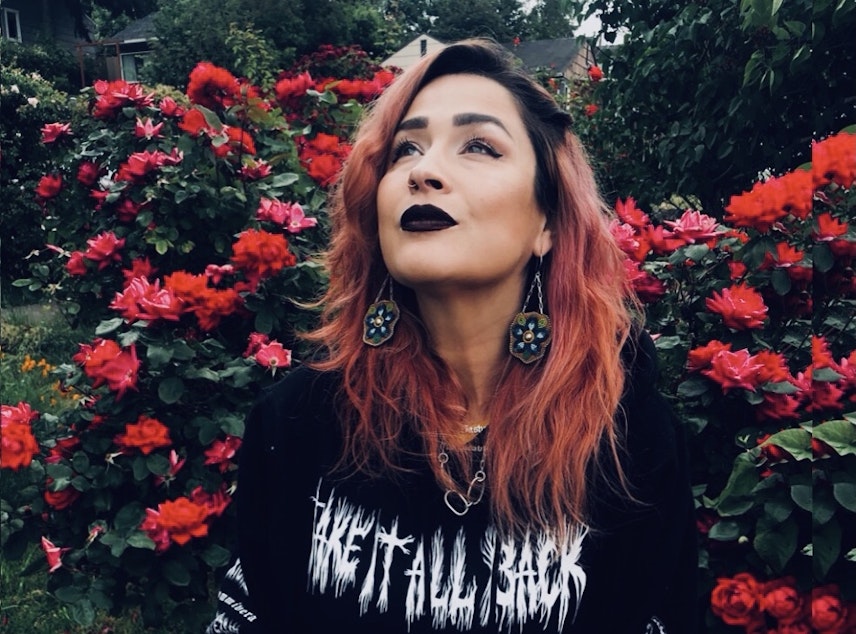In 'Thunder Song,' a Coast Salish punk creates her own form of medicine

If you read her award winning memoir, you may know Sasha taqwšəblu LaPointe as a "Coast Salish punk."
Now, LaPointe is back with a new essay collection, titled "Thunder Song: Essays."
In it, we get to know Sasha before she was a punk — as a little girl with a passion for "The Little Mermaid" soundtrack.
RELATED: This Coast Salish punk wants you to call her anything other than 'survivor'
Sasha's connection to music only grew as se discovered a local college radio station and tuned in on a boom box in the trailer she grew up in on the Swinomish reservation.
She later joined her a local punk band, Medusa Stare.
It was the pandemic and the George Floyd protests that made Sasha realize — music has always been a kind of medicine in her family.
"The world around me it was literally burning, like half the state was on fire that year, due to forest fires," LaPointe said. "The Earth was still very much in need of our attention, and care, and nurture."
The tumultuous state of the world made LaPointe think about her great-grandmother and namesake, Vi taqwšəblu Hilbert, a Lushootseed language preservationist.
LaPointe says Hilbert was deeply troubled by the events and global fallout of 9/11.
"She felt that we as people had lost our way [and] had forgotten how to be kind and compassionate, LaPointe said. "And be generous to one another, take care of one another; take care of the land."
Hilbert was a deep believer in the power of music, and the medicine of Coast Salish teachings. For months, the elder followed a daily routine of calling the Seattle Symphony, and telling whoever would listen that she wanted to commission a symphony.
Finally, a composer with the symphony called Hilbert back.
"She gave him two cassettes to listen to, one of her cousins spirit songs, and then the other belonged to Chief Seattle," LaPointe said.
A few years later, LaPointe joined her namesake and several other members at Benaroya Hall for a performance of the symphony, titled "The Healing Heart of the First People of this Land."
Like a true rebel, LaPointe showed up to the performance wearing a bullet belt, "too punk to get dressed up." Nonetheless, the day left an impact on the future author.
" [My great-grandmother] was very hopeful that if she could somehow share the teachings inherent within our Coast Salish culture, that maybe the world would start to be better," LaPointe said. "And so I think I really carry her determination and her vote with me, especially throughout the writing of this book."
At its core, "Thunder Song" is LaPointe's own gift of medicine to the world. Raw and unflinching, LaPointe's essay collection is sprinkled with songs that left a monumental impact on her.
One song stands out is Bikini Kill's "White Boy."
"I heard it really young as a teenager and I had never heard anything like that in my life. Something so direct and so full of fury and, and rage," LaPointe said. "I had never heard someone talk about the things that I'd experienced."
By the time LaPointe discovered "White Boy," the riot grrrl movement was already sunseting. But the music of Bikini Kill helped introduce the budding punk fan to a brand new world, one that was exhilarating, but often overwhelmingly white.
"I'd look around the room and it would strike me as really odd that I didn't see a single other Coast Salish or even Native person in the room. And that was really lonely and isolating," LaPointe said.
As the years have passed, punk has become more inclusionary, according to LaPointe. Today, she notices that there are more bands led by people of color, queer people, and even Native musicians.
LaPointe has used her own voice as a musician and singer to bring her experiences as a member of the Nooksack and Upper Skagit Indian tribes to the ears of listeners.
In the essay "Tulips," Sasha delves into her evolving understanding of the history of the Skagit Valley, and the tulip fields that paint the valley with color every year. The essay also chronicles her journey to write a song about the flowers, and their ability to evoke the painful colonial history of the region.
"When the tulips happen, it's hard not to get a little angry," LaPointe said.
Listen to the full interview with author Sasha taqwšəblu LaPointe by clicking the "play" button at the top of the page.
Sasha taqwšəblu LaPointe will be at Town Hall Seattle on March 11, 2023 to talk more about "Thunder Song." Tickets are available on Town Hall Seattle.org
Special thanks to Ryan Dudenbostel and the Western Washington University Symphony Orchestra.


